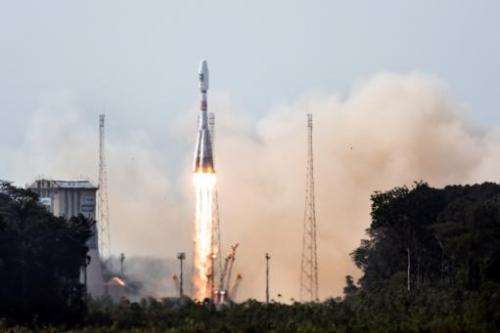A Soyuz rocket carrying a pair of Galileo In-Orbit Validation satellites lifts off from Europes Spaceport in Sinnamary, 12km from Kourou, French Guiana on October 12, 2012
Europe will expand its space presence this year through missions with a more practical application for Earthlings—notably the Galileo constellation of navigation satellites, the European Space Agency (ESA) said Friday.
Six Galileo satellites should be launched this year, the 50th anniversary of Europe's space exploration programme, ESA Director-general Jean-Jacques Dordain told journalists in Paris.
After delays in 2013, the constellation would be boosted to 10 orbiters, paving the way for initial services to start by year-end.
Four satellites for Galileo, the rival to the US Global Positioning System (GPS), are already in orbit, and four more were to have been launched last year.
"There were technical problems last year, and there are still a few to resolve," said Dordain.
Two satellites should be launched in June 2014, two more in October and another two in December.
Dordain said 2014 will be a "watershed year" with several missions "in service of the public".
Apart from Galileo, these include the launch of the first satellite for Europe's environment-monitoring Copernicus mission.
Another highlight for ESA, which rounded off 2013 with the launch of its star-monitoring satellite Gaia, will be the rousing next week of the slumbering Rosetta orbiter—which is scheduled to place a robot lab on a comet in deep space in November.
In June, ESA will launch Europe's fifth and final Automated Transfer Vehicle, the Georges Lemaitre, bringing supplies to the International Space Station.
Dordain said ESA's budget had dropped slightly from 4.2 billion to 4.1 billion euros in 2014—the bulk of which has been earmarked for the navigation and Earth observation missions.
An ESA ministerial meeting will take place in Luxembourg in December, where a decision is expected on the future design of the European satellite launcher Ariane.
© 2014 AFP























